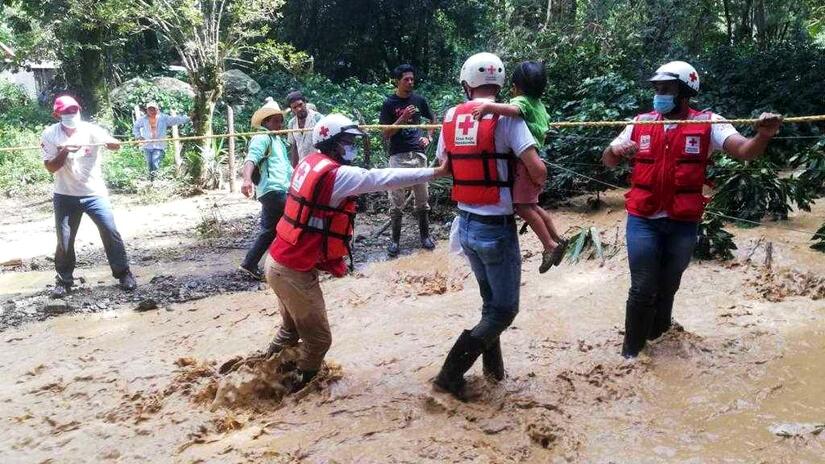Panama/Geneva, 10 November 2020 – The national, regional, and global resources of the International Federation of Red Cross and Red Crescent Societies (IFRC) are being mobilized as the full, destructive picture of Eta begins to emerge across Central America.
According to Red Cross assessments, more than 2.5 million people from Panama to Belize have been affected in some way, although the impacts are most severe in Honduras, Nicaragua and Guatemala.
Felipe del Cid, IFRC's Operations Manager for the Americas, said:
"Eta has been a devastating disaster. In Honduras alone, 1.7 million people have been affected. Many of them are women, children and members of indigenous communities that have lost everything and have no access to water and food. In several communities, families are drinking contaminated water and are in urgent need of support."
A plane and two trucks carrying a combined 98 tons of humanitarian aid are departing from the IFRC’s Humanitarian Logistics Hub in Panama to Nicaragua and Honduras. Aid items include mosquito nets, kitchen kits, hygiene kits, tarpaulins, jerrycans, cleaning kits, tool kits and COVID protection equipment.
The IFRC has launched a 20 million Swiss franc Emergency Appeal to support and dramatically expand local Red Cross efforts in Honduras, Nicaragua and Guatemala.
This operation aims to assist 75,000 of the worst affected people for at least 18 months. It will focus on rebuilding and repairing damaged shelters, improving access to clean water, hygiene and sanitation, addressing health care needs, including COVID-19 prevention needs, and providing psychosocial support. The operation will also seek to address issues related to gender and inclusion, as well as displacement. Historically, disasters in the region have led to increased movement of people towards urban centres.
IFRC is also deploying a series of Emergency Response Units from its global network as part of the multi-country operation.
"The region is facing a triple crisis: Eta, COVID-19 and the one caused by the pre-existing conditions of vulnerability that have been affecting Central American countries. We are talking about millions of people affected in seven countries. The need for humanitarian aid is dramatic," Felipe del Cid added.
National Red Cross Societies across Central America were active before Eta made landfall. They coordinated with authorities to prepare for Eta’s impact and assisted in the evacuation of communities lying in its path. Since the storm made landfall, they have been involved in search and rescue efforts, offered support to people in shelters, provided prehospital care to the injured, and offered psychosocial support and COVID-19 prevention information to survivors.
In addition to mounting this operation, IFRC is also closely monitoring potential new storm systems that could develop and threaten Eta-affected communities in the coming days.
Press release
Cyclone Lola leaves trail of destruction in Northern Vanuatu, warning for cyclone season
Cyclone Lola leaves trail of destruction in Northern Vanuatu, warning for cyclone season
| Press release

